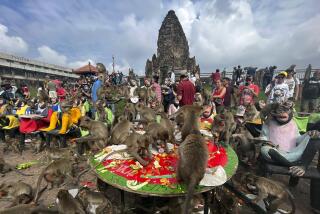Monkey noir? Yes, âDark Daysâ indeed
From Shakespeare to SpongeBob, there is, apparently, nothing John Rhys-Davies canât or wonât do. The plummy-voiced, English-born Welsh actor is best known here for his roles in âThe Lord of the Ringsâ trilogy -- he played Gimli and gave voice to Treebeard -- and as Indiana Jonesâ faithful, portly companion Sallah. Indeed, Rhys-Davies is such a democratic actor that he appears in the film clip designed to entertain those waiting in line for the Indiana Jones ride at Disneyland.
So itâs not surprising that he would agree to narrate a show called âDark Days in Monkey Cityâ for Animal Planet -- friends and colleagues Sean Astin and Bill Nighy gathered accolades and cult followings for narrating âMeerkat Manor,â on which âDark Daysâ is clearly based. But now that itâs out -- âDark Daysâ premiered last week -- we can only hope that Rhys-Davies has learned what most actors of his stature tend to take to extremes -- the power of no.
While âMeerkat Manorâ was a fascinating and addictive look at the social and political systems of its titular creatures, âDark Days in Monkey Cityâ is just plain silly, much more a lesson in over-the-top film editing than animal behavior.
Although it is based on the work of the Smithsonian Primate Project, the struggles of various tribes of toque macaques to dominate the most desirable portions of Sri Lankaâs Monkey City has been so tarted up with graphic-novel noir -- including unnerving and inexplicable â300â-like blood splatters -- that it seems more satire than animal drama.
Certainly there is something inherently dramatic about these creatures, if only that they tend to live in Sri Lankaâs picturesque ruined temples. But anthropomorphism run amok is the order of the day here. With names that include Portia, Lear, Hector, Gemini and Pandora, these poor primates are endowed with all manner of human emotions, tendencies and follies.
According to the hyper-dramatic narration, they ponder, they plot, they fret and exalt, do everything save speak in heroic couplets and experience schadenfreude. âThis can mean only one thing -- war,â Rhys-Davies intones in several variations, as if the monkeys were attempting to invade Poland or cross the Alps on elephants rather than get their little hands on a tasty fig tree.
Lost in all the script-chewing, graphic cutaways and soundtrack music designed to rearrange the viewerâs cardiac rhythms are the actual monkeys themselves, who, if left to their own devices, are probably pretty interesting.
A scene in which the monkey upper crust is allowed to eat waterlily roots and seeds that are closest to the shore and therefore more protected from water predators while the lower class must take its chances in the depths is fascinating, while Portia -- referred to over and over again as âlowly Portiaâ -- and her baby are excellent examples of tribe members who are tolerated but considered expendable.
Unfortunately, far too much time is spent attempting to persuade the audience that deposed leader Lear and upstart Hector are somehow mirror images of their mythic namesakes, which leaves one wanting to tap the filmmakers on the shoulder and say, âYou know, sometimes a monkey is just a monkey.â
Even with John Rhys-Davies narrating.
--
--
âDark Days in Monkey Cityâ
Where: Animal Planet
When: 10 tonight
Rating: TV-PG (may be unsuitable for young children)
More to Read
The biggest entertainment stories
Get our big stories about Hollywood, film, television, music, arts, culture and more right in your inbox as soon as they publish.
You may occasionally receive promotional content from the Los Angeles Times.











